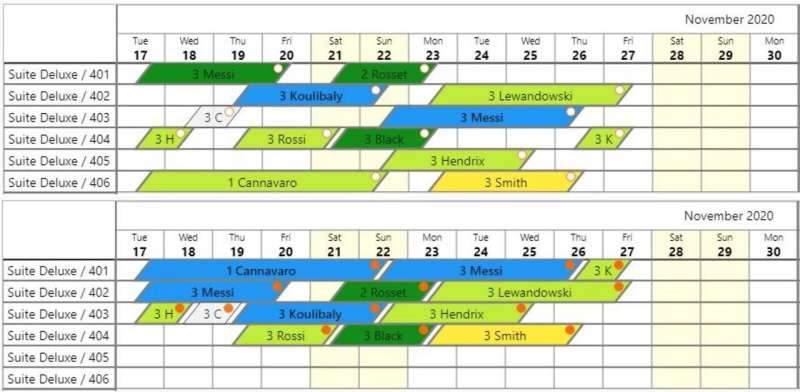#Tetris is no longer just a game, but an algorithm that ensures maximum hotel room occupancy

“#Tetris is no longer just a game, but an algorithm that ensures maximum hotel room occupancy”

To achieve full occupancy, hotels used to rely exclusively on experience, concentration and human abilities. Then came online booking, which made the reservation collection process faster, but did not solve the risk of turning down long stays because of rooms previously booked for short stays.
To avoid overbooking (accepting more reservations than there is room for) in some cases online sales are blocked before hotels are completely booked. The solution that the University of Trento has just discovered could change the life of hotels by increasing the number of occupied rooms and, therefore, in the revenue of hotel owners.
For an average Italian hotel (50 rooms), an annual increase in turnover of between 5 and 10% is estimated.
The most compact way to combine supply and demand was found by the RoomTetris algorithm, which takes its name from the computer game that inspired it, Tetris.
The software was developed by the Lion Laboratory (Learning and Intelligent OptimizatioN) of the Department of Information Engineering and Computer Science of the University of Trento. The research team, led by Roberto Battiti and Mauro Brunato, collaborated with Filippo Battiti’s local start-up Ciaomanager Srl which provided first-hand knowledge of everyday hotel management.
After the patent application, the procedure has also been the subject of an article in the international Journal of Hospitality and Tourism Technology.
“It is a new and revolutionary method to manage the accommodation of guests in hotel rooms,” comments Roberto Battiti. “We made the unexpected and surprising discovery of an excellent algorithm for assigning guests to rooms: there is no better way to do it and there is a mathematical theorem to prove it.”
In short, RoomTetris finds the best solution, the ideal combination between demand and supply, optimizing room occupancy. A tile-matching game that no human mind, no matter how experienced and skilled, could do better, with the seriousness and scientific rigor of a mathematical demonstration. Battiti is proud as a researcher but also satisfied for giving some hope to a sector that, more than others, has been heavily hit by the pandemic’s consequences.
“The intuition of the RoomTetris algorithm—he says—derives from the Tetris game, which is well-known among scientists and video game enthusiasts around the world. Colored tiles of different shapes fall in the playing field and players must place them so that they do not build up, therefore they have to fit the blocks in the best way possible in the free cells”.
He continues: “If the average profit of a hotel is 10-15% of the turnover, the increased room availability generated by the algorithm in the high season can increase it by a further 5-10% (depending on the average occupancy rate and the duration of the stay). With little effort (which is actually made by powerful computers in the cloud) there are certainly cases where the profitability can even double. I bet that within a few years almost all hotels will use our optimal algorithm, and that many hotel management habits will therefore change radically”.
In practice, with RoomTetris hotels will no longer allocate rooms at the time of booking, but when guests arrive at the hotel, providing the optimal solution for a higher occupancy rate and increased profitability. Tests to measure the improvements in the occupancy rate compared to the traditional allocation of rooms were carried out through a hotel simulator in different areas, and including real hotels throughout Italy, from Trentino to Sicily, from Sardinia to Puglia.
“The success of RoomTetris, which is the first optimal room allocation algorithm for the hotel industry, suggests that the room allocation process can be managed by this algorithm at check-in, ensuring the best possible performance, at global level,” concludes Battiti.
Room upgrade programs can increase hotel profits up to 35 percent
Roberto Battiti et al, RoomTetris: an optimal procedure for committing rooms to reservations in hotels, Journal of Hospitality and Tourism Technology (2020). DOI: 10.1108/JHTT-08-2019-0108
Provided by
Università di Trento
Citation:
Tetris is no longer just a game, but an algorithm that ensures maximum hotel room occupancy (2021, January 14)
retrieved 15 January 2021
from https://phys.org/news/2021-01-tetris-longer-game-algorithm-maximum.html
This document is subject to copyright. Apart from any fair dealing for the purpose of private study or research, no
part may be reproduced without the written permission. The content is provided for information purposes only.
If you liked the article, do not forget to share it with your friends. Follow us on Google News too, click on the star and choose us from your favorites.
For forums sites go to Forum.BuradaBiliyorum.Com
If you want to read more Like this articles, you can visit our Science category.



